After the ceremonies described in the last three posts we had one more task to complete before we went home. In the ANSF after action report on the ambush of Haji Nematullah, they reported seizing three large buckets of Home Made Explosives (HME) and three “milled metal devices with explosives inside”. We had no idea what they meant and were afraid they might be Explosively Formed Penetrator (EFP) mines. EFP’s were a big problem in Iraq and their source of origin is Iran. Iran being about 1/2 mile away from our safe house in Zaranj we took this report seriously and wanted to see them for ourselves. We also submit reports to the Marines at Camp Leatherneck when we get to verify stuff like this not because they asked to but as a courtesy on the off chance they too were wondering what the three “milled metal devices with explosives inside” were. We have no idea if they already know what we are reporting but it seems like the right thing to do.
On our last day in Zaranj we headed over the Provincial ANP headquarters to talk with the provincial commanders of the Afghan national Police (ANP) and National Directorate for Security (NDS) and to inspect the explosives recovered from the October 5th ambush.
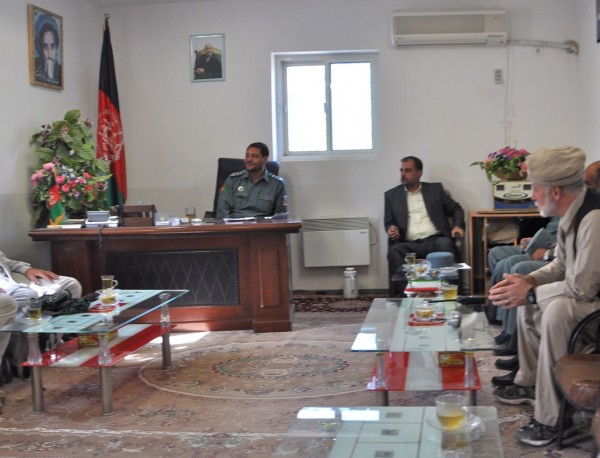
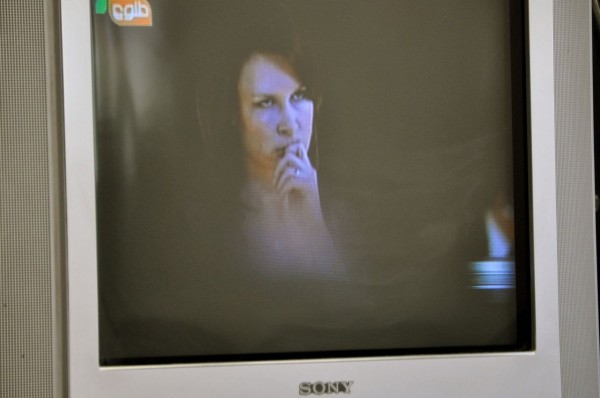
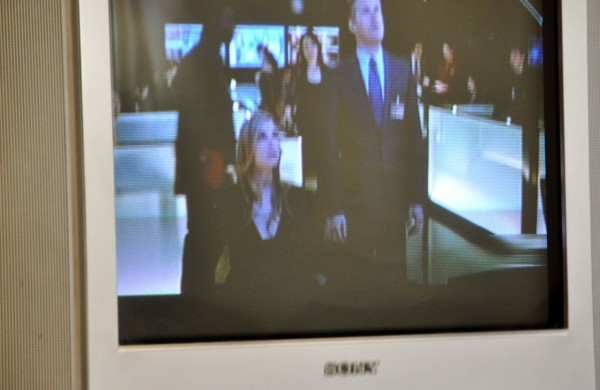
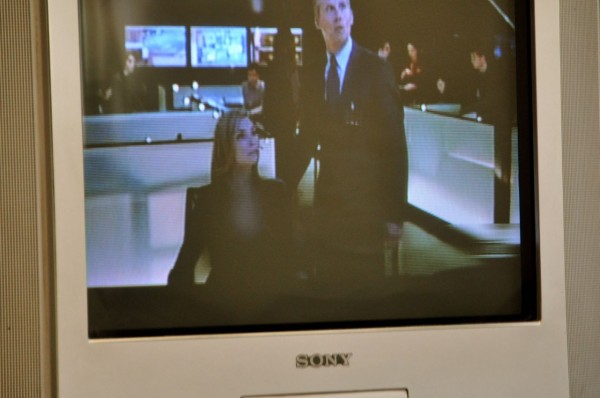
After talking with the Chief of Police we went out to inspect the take from last weeks ambush in their explosives locker.
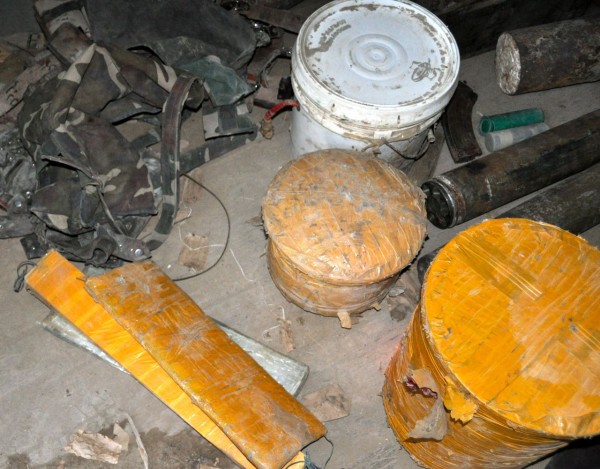
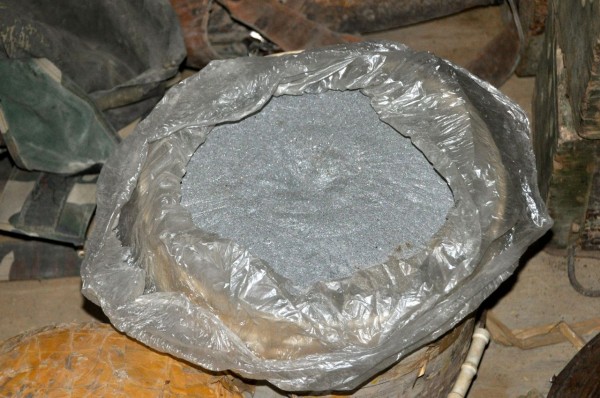
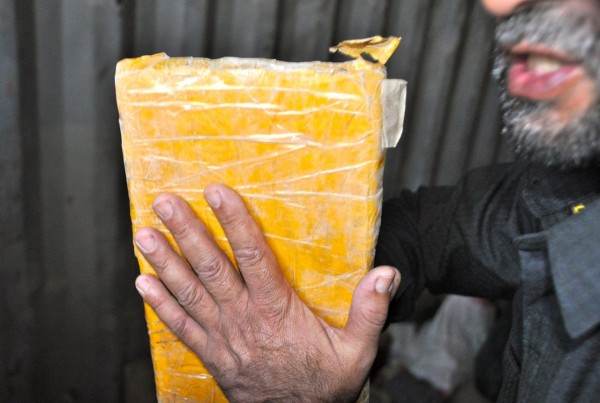
What we had come to see is what was described as a “milled metal device with explosives inside” and that turned out to be true except they were not EFP’s; they were artillery fuses.
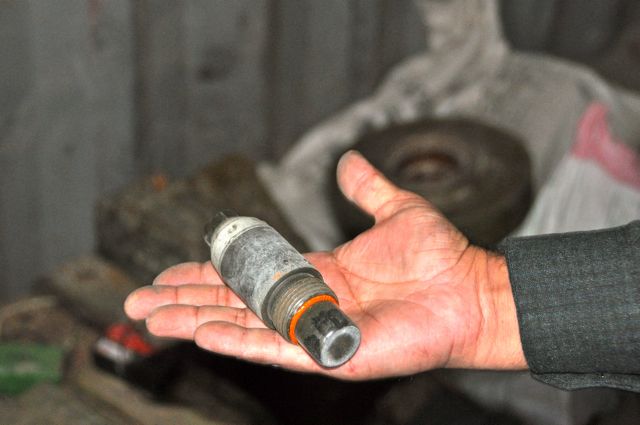
That was good news – EFP’s are a devastatingly effective weapon able to easily penetrate military grade armor. I have not heard of them being in Afghanistan but I checked with The Bot who had heard of one being found around Ghazni last year. A flood of them entering Afghanistan would be alarming to put it mildly.
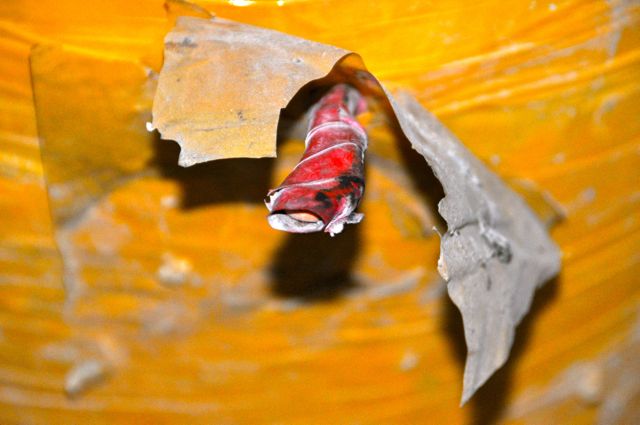
As we walked back towards our vehicles Mike Yon asked our escort – one of the local NDS men who spoke English – what else they needed and he replied “somebody to fix our trucks”.
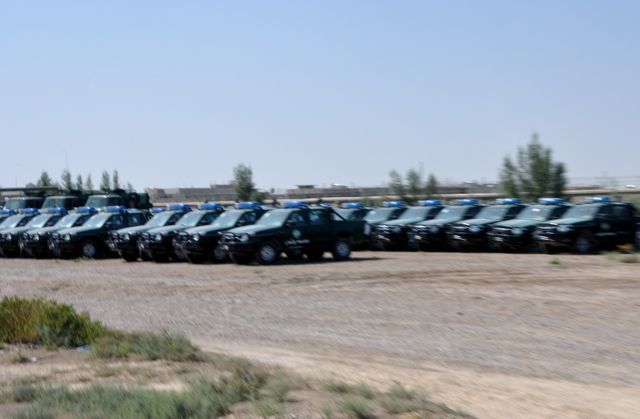
We continued on to find the Chief of Police having a Press Conference about a recent drug bust.
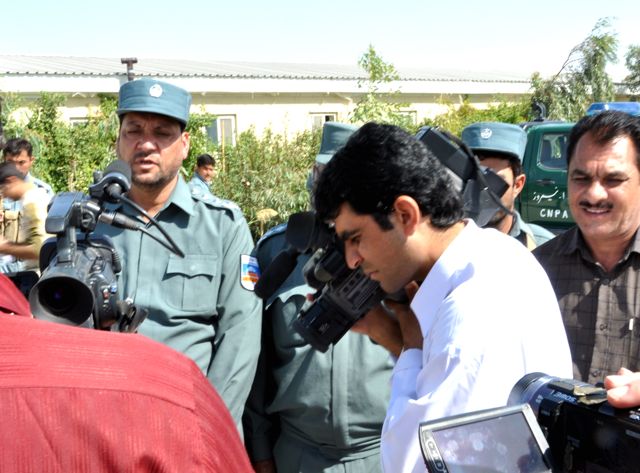
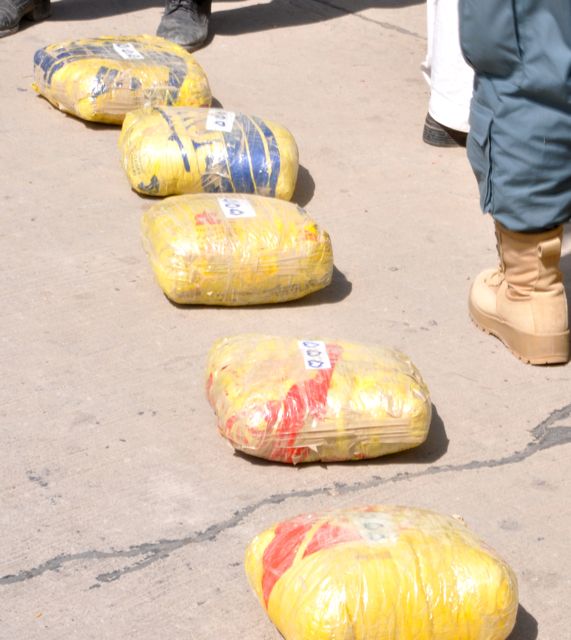
I appeared on the Aloyna Show last week and talked to the current conventional wisdom about the need to keep some sort of military presence in Afghanistan for the next 10 years. A link to that show is here and my segment starts around the 34 minute mark.
Our military is a big cumbersome leviathan designed to do one thing and one thing only; crush other nation state armies. Our military is good at killing bad guys. But killing bad guys is the easy part of war. It is everything else you have to do simultaneously that’s the hard part. We once knew how to do the “other things besides killing people” part of expeditionary warfare but that was long ago when the units dispatched half way around the world took a month or two to get there and remained in country for the duration. Our military can’t do that anymore – contractors can (stay in the same Province for years and years) and in doing so could fill in for fighting infantry but then you are outsourcing the fighting to mercenaries and have little reason to maintain such a large force structure.
If I remember my Roman History correctly Rome started down the road to ruin when they became unwilling to bear the burden of military service and outsourced fighting to Barbarian tribes. We have not reached that point. I know the Marine Corps is currently so flush with tier one (99.9% of the current pool) enlistment applicants that the wait for boot camp is 7 months minimum. The wait for candidates entering the officer training pipeline is over a year. We still produce the men needed for our military force structure but the amount of money it takes to do so is ridiculous. Using what the Romans called Auxilia for contingency operations makes perfect sense from a financial and political point of view and I support it 100% but our elites won’t.
When you are unable to do what is important, the unimportant becomes important which is why we spend millions to fly 5 pound bags of crushed ice from Saudi Arabia to our FOB’s. I saw that in Nangarhar – in Helmand there is an ice plant on Camp Bastion run by the Brits but the Marines I rode around with did not have coolers full of ice, which was mandatory with the American army units in Nangarhar. The Vietnam War may not be the best example of doing things right, but my father spent 13 months fighting in Leatherneck Square and the Arizona Territory of Northern I Corps (on the DMZ between South and North Vietnam). In all that time he saw ice once – it was flown in off a Navy ship – but by the time they had divided it evenly among the rifle companies it had mostly melted. Today crushed ice for coolers full of expensive sports drinks and bottled water is considered essential for troop morale.
There are Marines and soldiers in Afghanistan now who man small patrol bases and never see hot chow; let alone ice. I blogged about them in the past. But the guys (and now gals) who are out at pointy end of spear are at most 4% of our deployed military. Everyone else gets ice on demand and has access to unlimited amounts of high quality chow, pecan pie and ice cream.
The press rarely tells the story of the small minority of deployed troops who live, fight and die in conditions their forefathers would recognize unless it involves some sort of tragedy. I read one of the best pieces in this genre this morning in the Wall Street Journal. The story was well told and as supportive of the fighting men as such a piece can be. The journalist who wrote it played the story straight and did a fantastic job with such a tragic topic.
Yet by far, the most common story line concerning the troops deployed to Afghanistan are like this piece, which claims half of the vets returning from Afghanistan need medical treatment for the lingering effects of blasts and psychological trauma. At the very most 15% of those deployed to Afghanistan ever leave the FOB so how can half of them be so damaged?
Do I sound conflicted to you? I know I do, and it will take some distance to get things in perspective. And distance is what I have; I’m back in the US staying with friends while undergoing treatment for the lingering effects of a blast injury. Ironic, I know, given what I just wrote above. I am clean shaven, wearing normal American clothes no longer hear the call to prayer being blasted from speakers all over town five times a day. I miss hearing that call and don’t know why but I really miss it. That is so strange but it is and it is also nice to be back home.
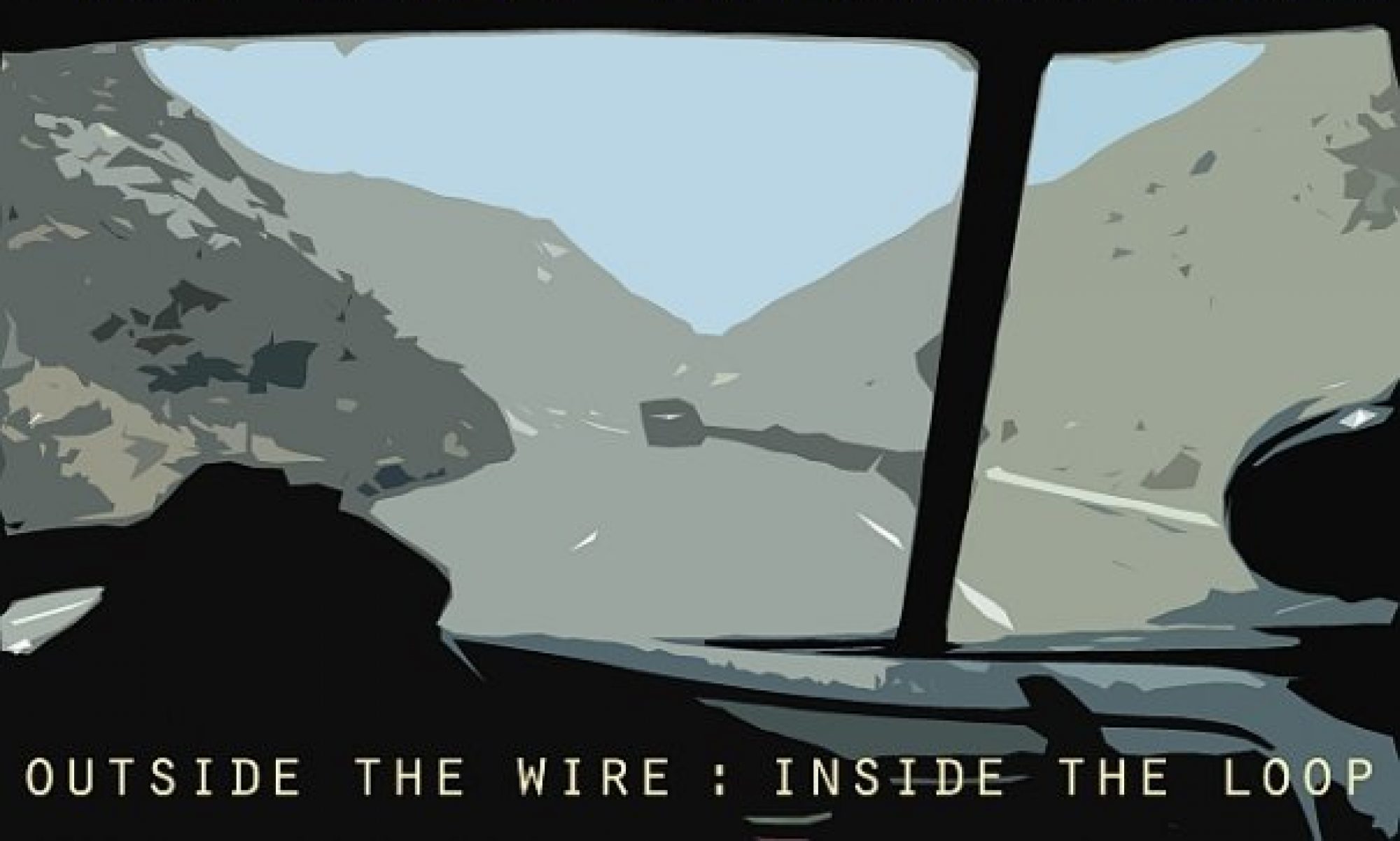
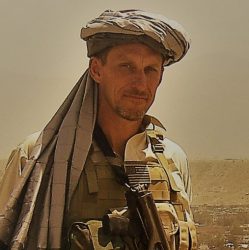

Welcome home Tim. S/F -matt
Yeah welcome back Tim.
Rock on brother.
Nice Blog! Nice Info! Really Appreciate the info =]
“Rome started to fall when they became unwilling to bear the burden of military service and outsourced fighting to Barbarian tribes. We have not reached that point.”
Sure about that perspective?
No draft, females in combat–gays too, reserves called to active duty, numerous rotations into combat zones and various other “modifications” to meet the needs.
Your truths are presented right here, in your latest article, in those pictures, starting with that office. Note the electrical equipment for comfort. See the upper end furniture. Note the sharp dressing of those government personnel. Go out and take another look at those trucks: Rather newer models…but they don’t run you say, no trained mechanics. Look back to your last few articles’ pictures for comparsion.
This is Rome pal…on the frontier, the barbarians are here, in your pictures presented as those who are working with Americans fighting the bad guys…fellow muslims, and native citizens of their country.
Hanson would say “too late” for this game we play.
Ask Pelosi or Kerry for some “stock” pics… This is the real key to understand the fall of Rome, unlock your eyes to how our government has destroyed America from within…like Rome those many centuries prior.
T&A for some R&R…who would’ve thought that still possible for an old, retired Marine? The desire to live…must be in one’s blood.
Always wear a helmet…and stand proud!
Nice job, thanks for sharing! Welcome home…ice baby ice!
LOL RJ – I’m learning IM speak because I seem to be the only American who does not have a smart phone and therefore doesn’t check the damn thing 55 times every hour. Is it me or do you too find some many people spending so much time staring at their smart phones annoying? I saw the guy in front of me in Church last Sunday checking the score of the Cowboys v Redskins game at least 30 times in an hour. So I don’t have a cell phone and I don’t think I’m getting one either on general principal alone.
Hey look at me – ranting off topic about something that has nothing to do with anything you said – never done that before.
1. Second the welcome homes.
2. Suspect one of the reasons you were able to operate is that you liked and felt comfortable with those folks.
3. Something most of us would have a hard time with.
4. It’s a gift -and not an inconsequential one.
5. Believe me, am speaking as the original stiff, white guy. Have seen that skill displayed by others and envied it.
6. Have wondered about the subject of your second to last paragraph. The numbers don’t work.
7. Have talked to a lot of young men returning from their 2nd, 3rd, 4th, and more deployments.
8. Most of them were proud of what they had accomplished and many were looking forward to returning to an AO.
9. A large dose of contempt for the CS involved with assignments back in CONUS was displayed. They wanted to do the work they had been trained for.
10. Everybody on the pointy end receives something of a psychological beat-down.
11. Most of the men seem to cope well: top quality personnel, good training, decent equipment, and unit rotations are factors.
12. With notable exceptions seized upon by the press, I’d call these troops hard professionals. God bless them.
13. Best of luck to you from here on out.
V/R JWest
welcome back to the world Tim. While you were gone the Europeans melted down their economy and our own super committee proved to be super midgets. A bunch of millionaires have been locked out by a bunch of billionaires.
Looking forward to reading Yon’s thoughts.
Would suggest you avail yourself of a large chunk of ice to cool a suitably appropriate beverage.
I believe we’ll need your services over here soon enough if only to put some of those OWS types to work on drain clearance and maintenance.
Welcome back, Tim. Things aren’t perfect here but it’s a damn sight better than the rest of the world.
It is Dave and thanks for the support
I’d like to add my “welcome back” to the long list of previous wellwishers. I read your post with mixed feelings. I have tried to keep abreast of things in Afghanistan since coming home in ’07, and your blog was my mainstay. Now, with you out of the picture and Michael Yon talking about changing his base to the Rio Grande, I’m casting about for a reliable reporter.
When is your book coming out?
If we had sent Toyota pickups instead of Fords, do you think the Afghans would have been better able to keep those running themselves? I know why we sent Fords but I am curious whether you think it would have been wiser to sent Toyotas.
Those Fords are all Mazda underneath their blue ovals. Toyota’s would have suffered the same fate.
===
Glad to have you home Tim.
OUR
OWN
WAY,
R
got the text to that WSJ article you linked to? subscription required to read it.
Here you go Steve and this piece is worth taking the time to read – it’s excellent reporting:
SHIR GHAZAY, Afghanistan—Capt. Matthew Stiger stood facing the battlefield memorial made of a rifle, helmet, boots and Benjamin Schmidt’s dog tags. In the long afternoon shadows, he prayed Lance Cpl. Schmidt’s family would get through the hard days to come. He saluted in a slow, deliberate motion.
In a traditional battlefield ceremony, Lance Corporal Benjamin Schmidt, killed by friendly fire in Afghanistan, is honored by his comrades-in-arms. WSJ’s Michael M. Phillips reports from Shir Ghazay.
And, in a voice only he could hear, Capt. Stiger begged forgiveness from the dead Marine, a 24-year-old sniper his men had mistakenly killed during a firefight on a dusty Afghan ridge.
Lance Cpl. Schmidt’s friendly fire death on Oct. 6 left an invisible rift running down the middle of Combat Outpost Shir Ghazay, dividing the snipers, who lost one of their own, and Capt. Stiger’s tank crews, who killed him. In war, troops willingly risk death at the enemy’s hands. When it’s delivered by a friend, the effect can be paralyzing.
Senior Marines in 2nd Battalion, 4th Marine Regiment, feared the snipers would lash out at the tankers, while the tankers would be so crippled by guilt that they would be unable to make the life-or-death decisions combat requires.
In the weeks since Benjamin Schmidt’s death, commanders have offered battlefield counseling sessions, private olive branches and public rituals aimed at getting their troops past the accidental killing and back into the field.
“One group of young men has to find it in their hearts to at least get along with, if not forgive, the people who killed their brother,” said Lt. Col. Bill Vivian, who as 2nd Battalion’s commander is over both the snipers and the tankers. “The other group has to have the maturity to be man enough to ask for forgiveness. And we all collectively have to be Marine enough to carry on with the mission.”
Friendly fire caused about 2% of U.S. casualties in World War II, Korea and Vietnam, military historians estimate. In one incident during the 1943 Sicily landings, U.S. antiaircraft gunners shot down or damaged 80 of 144 American troop planes, killing as many as 157, according to an article published by the Army’s Combat Studies Institute.
In 10 years of fighting in Afghanistan and Iraq, the fratricide rate has been much lower, in part because modern warfare involves smaller units making smaller battlefield movements. There have been 20 U.S. friendly fire fatalities out of 6,100 total deaths, a rate of less than half a percent, according to iCasualties.org. The most infamous was the friendly fire death of professional football player-turned-Army Ranger Pat Tillman Jr. in Afghanistan in 2004. Another 18 coalition troops have died in fratricide incidents, including 12 from the U.K., which is, after the U.S., the largest international contributor of forces to the wars in Iraq and Afghanistan, iCasualties.org reported.
But for the units on the ground that have to keep fighting, the impact of friendly fire is no less debilitating for its infrequency. War, said Lt. Col. Vivian, “is a very human business.”
Lance Cpl. Schmidt grew up in San Antonio hanging out with NBA stars with his father, David Schmidt, team doctor for the San Antonio Spurs. From his mother, Becky Whetstone, a marriage and family therapist who dabbled in stand-up comedy, he acquired a sharp sense of humor.
After high school, he enrolled in Texas Christian University, but spent more time partying than in class and was in danger of failing out, his mother said. When his parents confronted him about his alcohol use, he shocked them by joining the Marines.
In the service, he pursued one of the most challenging career paths, the snipers. He came home from his first Afghan tour telling his mother he had learned to apply himself. He talked about getting a doctorate in history.
Earlier this year, Lance Cpl. Schmidt told his parents the Marines had required him to extend his four-year enlistment because his platoon was deploying to Afghanistan again. In reality, he went voluntarily because he didn’t want his friends to go to war without him, his fellow Marines say.
On Thursday, Oct. 6, 2nd Battalion’s mission was to oust Taliban fighters from villages that run along a desiccated riverbed. Insurgents use the riverbed, or wadi, to cross northern Helmand Province, part of the Taliban’s traditional power base in southern Afghanistan.
Snipers were out in force for the operation near Lwar Julji village, having been assigned the task of picking off enemy fighters while infantrymen swept through mud-walled compounds and farm fields. One sniper team, Head Hunter 1, positioned itself on a finger of elevated land, armed with a .50-caliber rifle capable of penetrating a car engine from a mile away.
Lance Cpl. Schmidt was part of Head Hunter 2, an eight-man team that took up firing positions on another rise 100 yards to the south. Teamed with Sgt. Roberto Colon, Head Hunter 2’s leader, he was trying to locate a Taliban sharpshooter who was peppering the Marines.
Every time the Taliban fighter fired, the snipers heard the report from his weapon, then later, the bullet’s impact. That indicated the shooter was more than 1,200 yards away. That’s the range at which such rounds slow to below the speed of sound, and the noise passes the bullet itself.
Lying on his stomach, Sgt. Colon, 30, of Woodbridge, N.J., peered through binoculars and spotted two men on the far side of the wadi. After each shot, they ducked behind a waist-high wall.
Sgt. Colon ordered most of his men to take cover while he radioed the adjacent sniper team and talked them onto the insurgents’ location. A sniper from Head Hunter 1 opened fire with the .50-caliber gun, killing one.
Around 4:30 p.m., Lance Cpl. Schmidt moved forward to join Sgt. Colon and two other U.S. snipers, squeezing in to look over the sergeant’s shoulder. If Sgt. Colon began firing, Lance Cpl. Schmidt’s job would be to track the vapor trails of outgoing rounds and guide him to his targets.
What happened next is still the subject of a formal Marine Corps investigation, the whys and hows yet to be determined. What the Marines on the battlefield that afternoon know is that a tank from Alpha Co., 2nd Tank Battalion was in the area to provide muscle for the infantry. It was about 700 yards away, north of the two sniper teams, according to Sgt. Colon. Shortly after Head Hunter 1 killed the insurgent, the tank opened fire on Head Hunter 2, spraying Sgt. Colon’s men with machine-gun rounds.
As they scrambled for cover, the other snipers noticed that Lance Cpl. Schmidt didn’t move. He had been hit in the head.
Sgt. Colon and another sniper, Cpl. Nicholas Abey, pulled Lance Cpl. Schmidt to a more secure spot. As they did so, they exchanged looks that said they knew their friend was gone.
A Navy corpsman bandaged Lance Cpl. Schmidt’s wounds before he was evacuated to a series of field hospitals. Just after 7 p.m., a doctor pronounced him dead.
In a mud-brick village on the night of Oct. 6, Sgt. Colon sat down with the rest of the snipers. The tank that fired the shots was parked nearby, and the sergeant knew he had to calm his men and keep them “from walking the 50 yards to the tankers and saying or doing something that they would most likely regret.”
It was an accident, Sgt. Colon told his men, a terrible accident, but an accident nonetheless. He told them about losing a Marine in combat in Iraq, and the guilt and fear that followed. He told his men that Lance Cpl. Schmidt “wouldn’t want us to sit around and sulk while there were still Taliban on the other side of the hill,” the sergeant recalled later.
The incident reverberated across the battalion. Senior Marines kept the tank unit out of action. But Lance Cpl. Schmidt’s unit, Head Hunter 2, went back to the front line after a night’s rest.
Snipers are a breed apart even within the Marines, a cliquish group of specialized killers who stalk in teams as small as two men, each dependent on the other for survival. They keep count of their kills on the barracks wall, ticking them off like prisoners marking time.
Viewed from inside that brotherhood, the tankers seem to have it easy. They fight from within a 70-ton armored box, so heavy they drive around culverts to avoid crushing them. But the tanks provide firepower the grunts appreciate when they’re in a jam. “They’re the cavalry,” said Sgt. Colon.
On Oct. 7, one day after the shooting, the commander of the sniper platoon, Gunnery Sgt. Jairo Fredonis, a 37-year-old from the Bronx, tracked down the commander of the four-man tank crew that fired the fatal shot. “How could you do that?” Gunnery Sgt. Fredonis recalled asking the tanker sergeant. “What happened? How could you make that mistake?”
The sergeant stood mute, recalled Gunnery Sgt. Fredonis, who stalked off.
Military investigators arrived in the area to address the legal aftershocks of a friendly fire death. Senior commanders were there to address the emotional aftershocks.
Safe behind the ridgeline that sloped down to the wadi, Lt. Col. Vivian, the battalion commander, and Col. Eric Smith, the top Marine in the area, gathered the tankers in a semicircle, even as gunfire continued on the other side.
Col. Smith worried about getting the tank crews through the next 24 hours. “No one woke up today intending to kill another Marine,” he told the tankers.
The commanders kept the tankers out of combat. Two days later, after the village-clearing operation ended, they were sent back to the unit’s outpost at Shir Ghazay.
The sniper teams went to the main battalion base in Musa Qala, about 15 miles northeast of Shir Ghazay, where they could be with each other and away from the tankers. Over the days that followed, they went through the motions. They clustered together in the mess tent over packaged scrambled eggs and grape Kool-Aid. They mourned and fumed.
Gunnery Sgt. Fredonis decided to keep secret the identity of the tank commander, the man with direct authority over the tank’s guns. “I am confident my Marines are mature enough to know they can’t punish him for the rest of his life,” said Gunnery Sgt. Fredonis. Still, he said, “I think it’s best they don’t have a face.”
“I’d punch him in the face,” admitted one sniper. “He probably wanted to know what it’s like to kill someone. Now he knows.”
Years earlier, Gunnery Sgt. Fredonis had lost his 14-year-old brother to an accident, and he confessed in a letter to Lance Cpl. Schmidt’s parents that he enlisted in the Marine Corps in search of family. “I loved your son—I love him still,” Gunnery Sgt. Fredonis wrote. “He was my little brother, and I will forever miss him.”
Senior Marines were more worried about the tankers than the snipers. While the snipers could direct their fury and grief across camp, the tankers could aim only at themselves.
The tank company commander, Capt. Stiger, who had earned a bronze star for valor in Iraq, took the incident especially hard, even though he wasn’t on the ridgeline when it happened. He searched for ways to keep his men from succumbing to self-doubt. During the second week of October, the captain gathered his 100-man company to brace them for five more months of combat.
“This incident will be something that we have to deal with the rest of our lives,” Capt. Stiger recalled saying. “Remorse, anger and depression are things that some of us will have to deal with for years down the road. For now, we have work to do; we have to deal with it and move on.”
After a few days, Capt. Stiger started sending his men out on simple missions, protecting roads and setting up blocking positions to inhibit Taliban movements. “If we don’t give them a sense of purpose, it will ultimately destroy them,” said Capt. Stiger, 33, of Colorado Springs, Colo. “We’re giving them a sense of purpose.”
He kept two tankers out of action for more than a week; he didn’t think they were ready to face combat.
On Oct. 13, a week after Lance Cpl. Schmidt’s death, the snipers of Head Hunter 2 returned to Shir Ghazay and found themselves sharing the small outpost with the tank crews.
Capt. Stiger found Sgt. Colon outside the sniper team’s tent. The captain struggled for words that would suffice.
“There’s no other way I can put it,” he told the sniper, according to both men. “I apologize for the actions of my company.”
Sgt. Colon appreciated the gesture, a commander taking responsibility for his unit’s mistake. “They’re being bigger men about it,” the sergeant said the next day. “I’m trying to get my men to be bigger men about it.”
The top officer at the outpost, Capt. George Flynn, commander of the battalion’s Echo Co., an infantry unit, was something of a neutral party, neither sniper nor tanker. Some of his Marines had befriended Lance Cpl. Schmidt during his first combat tour, but his men also counted on the tanks for firepower.
The snipers had attended a memorial service at battalion headquarters. In an unusual move, Capt. Flynn, a 32-year-old from Woodbridge, Va., asked Lt. Col. Vivian to authorize a second ceremony at Shir Ghazay. That gave the tankers a chance to pay their respects to Lance Cpl. Schmidt in full sight of the snipers.
In the late afternoon of Oct. 14, Sgt. Colon and his team gathered in the gravel lot at the center of camp. Most sat on cots facing a knee-high wooden box, which bore a photo of Lance Cpl. Schmidt in helmet and fatigues. In the picture, he cradled a rifle with a long sniper scope.
Behind the snipers gathered the infantrymen and, at the back, the tankers, their faces glum and their hands clasped behind their backs as the Marine Corps hymn played over loudspeakers in an endless loop.
One of Lance Cpl. Schmidt’s friends, Cpl. Jordan Cody, a 22-year-old from Spindale, N.C., marched forward holding a rifle stiffly in front of him, paused, and inserted it, bayonet-first, into the box, which had been built for such ceremonies.
Cpl. Nicholas Crandall, 26, from Kalamazoo, Mich., then balanced a camouflaged helmet on the rifle’s stock. Cpl. Ruben Chavez, 28, of Amarillo, Texas, arranged a pair of combat boots, toes towards the gathered Marines, and dangled a set of Lance Cpl. Schmidt’s dog tags from the rifle’s pistol grip.
Sgt. Colon removed a cord from his own neck and placed it next to the dog tags. Hanging from it was a bullet, symbol of the one-shot, one-kill sniper fraternity.
“While his death was tragic,” Sgt. Colon told the Marines, “I don’t believe that he would have wanted it to happen anywhere else other than right beside his brothers.”
As a light breeze flicked at the American and Marine Corps flags, Capt. Flynn bluntly told the snipers and tankers to put their feelings aside.
“Lance Cpl. Schmidt had a dangerous job in a dangerous business and was working in a dangerous environment, and under those conditions people get hurt,” he said. “And in the case of Lance Cpl. Schmidt and many others, people die. It happened, and we need to prepare for it to happen again. It just comes with the job.”
He continued: “We need to accept it. We need to learn from it. We need to move on, together.”
On command, the battalion sergeant major stepped forward and called the roll of the sniper platoon.
“Cpl. Courter.”
“Present,” the Marine responded.
“Sgt. Colon”
“Present.”
“Lance Cpl. Lanz.”
“Present.”
When the sergeant major called, “Lance Cpl. Schmidt,” he was met with silence. A little louder, he called, “Lance Cpl. Benjamin Schmidt.” No response. “Lance Cpl. Benjamin W. Schmidt,” he bellowed, as if irked that his fallen Marine dared miss roll call.
Then, quieter, he said, “Honor the dead.” A Marine held a bugle to his lips, from which came a recording of taps.
One by one the Marines walked forward to pay their respects. First came the snipers. Last came the tankers. Some stood. Some knelt, alone with their thoughts about a lost friend.
Here is a Great Website You might find Fascinating that we Motivate You.
I am often to blogging and i really appreciate your content. The article has really peaks my interest. I’m going to bookmark your site and preserve checking for brand new information.
Ah Tim San, great post, and a great clip with Alyona! I Clipped it down to just your gig, for an easy share, so folks don’t have to sit through the whole episode, or download that 460 meg file :-)// WELCOME HOME dude !!!
http://www.youtube.com/watch?v=M491sdmKycU
excellent interview. Sounds like an opportunity for an ice making plant exists. Undercut the Saudi made product by a dollar/bag and make a fortune.
The more I learn the more I wonder what happened to common sense.
Oh and have a happy turkey day.
I’m looking forward to the book! I have very fond memories of the time with you in this part of the world and we miss you in jbad.
“Do I sound conflicted to you?”
Ah, now we learn that “NATO” has mistakenly killed about 25 Pakistani troops on the border area. Pakistan has shut down supplies going into Afghanistan. For how long one can only wait till the American government offers up some “treats” and “sincere apologies” which will soothe hurt feelings…
Meanwhile, over in Iraq our American military sneaks out of this country while Al-Sadr gathers his forces in harmony with his Shiite government’s wishes. Sunnis are arming more men, while the Kurds mumble “not again!” under their breath.
Some people, here in America, wonder if Hillary will join Obama on the forthcoming ticket to beat the “nasty” Republicans. She is so smart, just like Obama.
Yea, but my dog also comes when I call it!
Will the voices of American compassion come forward with phony calls to embrace all veterans of this war on terror?
“Thank you for your service” has been one of the most hollow wisps of insincerity since this war began I have ever heard coming from the lips of those who would never don an American military uniform in defense of this country!
Lost blood and treasure…but don’t worry, your “friends” will see to it via OWS and other “mob” endeavors that the real villains are brought to justice in America!
Meanwhile, at your local Veteran’s hospital men and women will gather for help and social sharing of realities most other Americans have taken for granted for far too long.
Know your enemy, especially when it has been living within your immediate world as your neighbor and fellow countryman.
Strong horse, weak horse…and then there is that “lying” horse.
Me…I’m more than conflicted, much more than I ever thought I could be, nor would ever want to be. Then again, when I saw Bremmer with his “rep tie” going to Iraq to “organize” our efforts I just knew we were in deep sh*t…
Never did I think I would live to see this again!
“My attention wandered over to the TV screen where an Iranian station was blurring out the cleavage of female actresses …”
The picture shows the logo of TOLOnews on the TV screen.
TOLOnews is owned by the MOBY Group which financed the start of its business with U.S. government money (http://en.wikipedia.org/wiki/Tolo_TV).
It has absolutely nothing to do with Iran.
Someone who has been in Afghanistan should no that. So why this misinformation?
b-we’ve gotta work out a differentiator-otherwise people are gonna mistake us for one another.
Hi there! I simply wish to give a huge thumbs up for the good data you’ve gotten right here on this post. I will likely be coming back to your blog for extra soon.
I was more than happy to search out this internet-site.I needed to thanks on your time for this excellent read!! I positively enjoying every little bit of it and I have you bookmarked to take a look at new stuff you weblog post.
Spot on with this write-up, I truly think this web site needs far more consideration. I’ll most likely be again to learn far more, thanks for that info.
Many others should follow your example…keep up the brilliant work! I’ll be back!